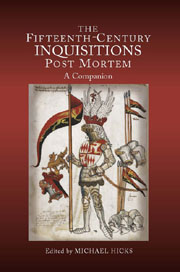Book contents
- Frontmatter
- Contents
- List of Tables and Figures
- List of Contributors
- Preface
- Glossary
- Abbreviations
- 1 Introduction
- 2 Crossing Generations: Dower, Jointure and Courtesy
- 3 The Lesser Landowners and the Inquisitions Post Mortem
- 4 Tales of Idiots, Signifying Something: Evidence of Process in the Inquisitions Post Mortem
- 5 The Value of Fifteenth-Century Inquisitions Post Mortem for Economic and Social History
- 6 ‘Notoriously Unreliable’: The Valuations and Extents
- 7 The Descriptions of Land Found in the Inquisitions Post Mortem and Feet of Fines: A Case Study of Berkshire
- 8 Re-assessing Josiah Russell's Measurements of Late Medieval Mortality using the Inquisitions Post Mortem
- 9 A Great Historical Enterprise: The Public Record Office and the Making of the Calendars of Inquisitions Post Mortem
- 10 Writs and the Inquisitions Post Mortem: How the Crown Managed the System
- 11 ‘Thrifty Men of the Country’? The Jurors and Their Role
- 12 Place-Names and Calendaring Practices
- Index
4 - Tales of Idiots, Signifying Something: Evidence of Process in the Inquisitions Post Mortem
Published online by Cambridge University Press: 05 February 2013
- Frontmatter
- Contents
- List of Tables and Figures
- List of Contributors
- Preface
- Glossary
- Abbreviations
- 1 Introduction
- 2 Crossing Generations: Dower, Jointure and Courtesy
- 3 The Lesser Landowners and the Inquisitions Post Mortem
- 4 Tales of Idiots, Signifying Something: Evidence of Process in the Inquisitions Post Mortem
- 5 The Value of Fifteenth-Century Inquisitions Post Mortem for Economic and Social History
- 6 ‘Notoriously Unreliable’: The Valuations and Extents
- 7 The Descriptions of Land Found in the Inquisitions Post Mortem and Feet of Fines: A Case Study of Berkshire
- 8 Re-assessing Josiah Russell's Measurements of Late Medieval Mortality using the Inquisitions Post Mortem
- 9 A Great Historical Enterprise: The Public Record Office and the Making of the Calendars of Inquisitions Post Mortem
- 10 Writs and the Inquisitions Post Mortem: How the Crown Managed the System
- 11 ‘Thrifty Men of the Country’? The Jurors and Their Role
- 12 Place-Names and Calendaring Practices
- Index
Summary
By the time Shakespeare had Macbeth complain that ‘life [was] a tale told by an idiot … signifying nothing’ it was evidently a commonplace that the words of idiots were of no account. They had no more significance in the earlier context of fifteenth-century tenurial inheritance, and for that reason the designation ‘idiot’ was one to be avoided or hidden if at all possible. But cases of idiocy do signify something for the historian because of the glimpses they give of individuals protecting their interests as best they could in unusual and urgent adverse circumstances. By teasing out the personal narratives underlying the citations of idiots in CIPM xviii–xxvi (1399–1447), this chapter demonstrates how these administrative records provide evidence of life and thinking. In particular, the degree to which concealment was effective reflects the relative strength of family interests and the royal prerogative. A sense emerges of the freedom of action which individuals understood themselves to have within the tacitly agreed conventions and limits of the IPM process.
This process can usefully be thought about in terms of the differing interests of the royal administration and the individual. At times administrative and family priorities coincided, and individuals found that it was in their interests for inquisitions to be held and circumstances recorded; but often there was a strong motive towards concealing things from the administration. Concealment goes to the heart of understanding the IPMs as the result of a process, and it is an issue which brings us close to the imperatives, motivations and strategies at work as individuals and families sought to protect their interests both in the present and for the future.
- Type
- Chapter
- Information
- The Fifteenth-Century Inquisitions 'Post Mortem'A Companion, pp. 79 - 96Publisher: Boydell & BrewerPrint publication year: 2012



